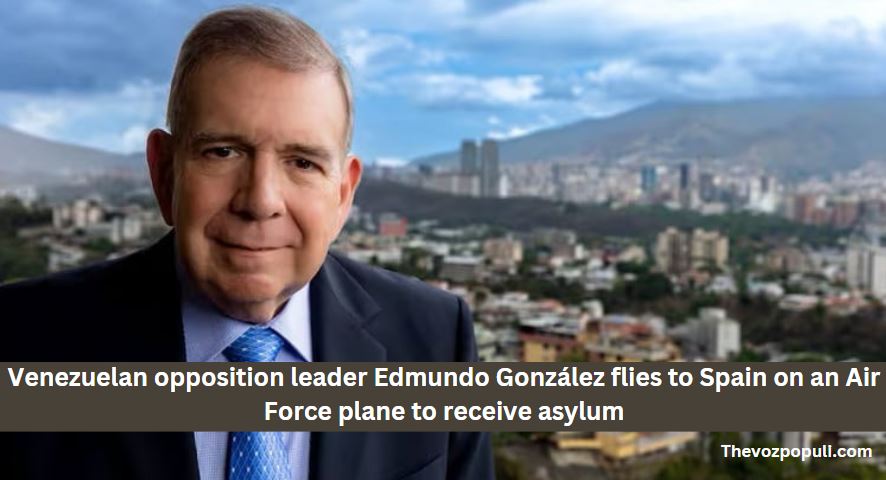Spain has welcomed Venezuelan opposition leader Edmundo González, who has been threatened by Nicolás Maduro’s regime following recent elections. According to a statement from the Ministry of Foreign Affairs, an Air Force plane was dispatched to bring González to Spain.
The Venezuelan opposition leader sought asylum after Maduro’s government issued an arrest warrant against him. González’s team had indicated in recent days that he was in hiding to evade capture.
On Sunday morning, Spain’s Ministry of Foreign Affairs and Cooperation, led by José Manuel Albares, announced that González had been transported to Spain on a Spanish Air Force plane. The ministry confirmed that the government facilitated the transfer in response to González’s asylum request.
Spanish diplomats reported, “Edmundo González departed from Caracas to Spain aboard a Spanish Air Force plane. The Spanish government arranged all necessary diplomatic and logistical support for his transfer.”
Details about the flight and its route remain sparse. Still, sources confirm that the Air Force Falcon first flew to Santo Domingo in the Dominican Republic, then proceeded to Maiquetía in Venezuela before returning to the Dominican Republic. The aircraft then made a stop in the Azores before arriving in Spain.
Spain’s position
Edmundo González’s plight has recently become a focal point of political debate in Spain, with opposition parties urging the government to take decisive action in support of the Venezuelan leader. At a Federal Committee event for the PSOE on Saturday, Prime Minister Pedro Sánchez lauded González as a “hero,” emphasizing that Spain would not abandon him.
On August 16, Spain, in collaboration with the European Union and twenty other nations, issued a joint declaration calling for “good sense and prudence” in Venezuela. The statement underscored the need for “acceptance and respect for the dignity and integrity of all people,” fundamental principles essential for harmonious international relations.
The declaration further urged respect for democratic principles and the human rights and fundamental freedoms of all Venezuelans, particularly the rights to peaceful protest and freedom of expression. The signatories expressed concern over the current situation in Venezuela, citing alarming reports of arbitrary detentions without due process and demanding the immediate release of those detained.
Order against Edmundo Gonzalez
On Monday, a Venezuelan court specializing in terrorism-related offenses issued an arrest warrant for Edmundo González Urrutia, the opposition leader and presidential candidate from the largest anti-Chavez bloc in the July 28 elections. This action came less than an hour after the Public Prosecutor’s Office made the request.
The arrest order, posted on Instagram by the Public Prosecutor’s Office, stipulates that once González Urrutia is apprehended, he must be immediately handed over to the prosecutor’s office. The office is then required to present him before the court within 48 hours of his arrest.
Frequently Asked Questions
Why did Edmundo González travel to Spain?
Edmundo González sought asylum in Spain due to persecution from Nicolás Maduro’s regime in Venezuela. An arrest warrant had been issued against him, prompting his request for protection and asylum in a safe country.
How did Edmundo González travel to Spain?
González was transported to Spain on a Spanish Air Force plane. The Spanish government arranged the flight as part of its diplomatic and logistical support for his asylum request.
When did Edmundo González arrive in Spain?
González’s transfer to Spain occurred on a Sunday morning, as announced by the Spanish Ministry of Foreign Affairs and Cooperation. The exact date of his arrival was coordinated with the logistics of the Air Force flight.
What was the political context surrounding González’s asylum request?
González’s situation had become a significant topic of political debate in Spain, with opposition leaders urging the government to support him. Prime Minister Pedro Sánchez referred to González as a “hero” and assured that Spain would not abandon him.
What international actions were taken in response to González’s situation?
On August 16, Spain, the European Union, and twenty other countries issued a joint declaration calling for respect for democratic principles and human rights in Venezuela. The statement condemned arbitrary detentions and urged the immediate release of those held without due process.
How was the transfer of Edmundo González handled logistically?
The Spanish Air Force plane first flew to Santo Domingo in the Dominican Republic, then to Maiquetía in Venezuela, before making a stop in the Azores on its way to Spain. This route was part of the coordinated effort to ensure González’s safe transfer.
What are the implications of González’s asylum for Spain-Venezuela relations?
González’s asylum could strain relations between Spain and Venezuela, as it highlights ongoing political tensions and human rights concerns. Spain’s decision to grant asylum underscores its stance on protecting individuals facing persecution and its commitment to international human rights principles.
Will more information be provided about the flight and its details?
Details about the flight’s exact route and logistics have been limited. The Spanish government has not disclosed extensive information about the flight’s specifics beyond what was necessary for the public announcement and diplomatic assurance.
Conclusion
Edmundo González’s flight to Spain aboard an Air Force plane marks a significant moment in the ongoing crisis involving Venezuelan opposition leaders. His arrival underscores Spain’s commitment to providing asylum and protection to those persecuted under authoritarian regimes. This high-profile transfer reflects Spain’s broader stance on upholding human rights and democratic values amidst complex international relations.
González’s journey highlights the intersection of political asylum and global diplomacy, illustrating the challenges faced by individuals fleeing oppressive regimes. The logistical and political efforts involved in his transfer also emphasize Spain’s role in addressing humanitarian issues on the international stage. As the situation unfolds, it will continue to influence Spain-Venezuela relations and the broader discourse on political asylum and human rights.



